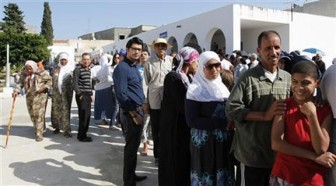TUNIS, (Reuters) – Tunisian election officials counted the votes today after the country’s first free election, 10 months on from the moment Mohamed Bouazizi set himself on fire in a protest that started the Arab Spring uprisings.

Most forecasts point to a moderate Islamist party emerging with the biggest share of the vote, an outcome that worries secularists and could be replicated in other Arab states when they hold their own post-Arab Spring elections.
Turnout in the vote, for an assembly which will sit for one year and draft a new constitution, was more than 90 percent — a mark of Tunisians’ determination to exercise their new democratic rights after decades of repression.
U.S. President Barack Obama said Tunisia’s revolution in January, which began with Bouazizi and ended with autocratic President Zine Al-Abidine Ben Ali fleeing abroad, had “changed the course of history.”
“Just as so many Tunisian citizens protested peacefully in streets and squares to claim their rights, today they stood in lines and cast their votes to determine their own future,” he said in a statement issued by the White House.
The suicide of vegetable peddler Bouazizi, prompted by despair over poverty and government harassment, provoked mass protests which ended Ben Ali’s 23-year grip on power.
This in turn inspired uprisings in Egypt, Libya, Yemen, Syria and Bahrain which have re-shaped the political landscape of the Middle East and North Africa.
With an unexpectedly large number of ballot papers to count, election officials said it was likely to be Monday or even later before they have results to announce.
State radio reported that incomplete counts in two provincial cities, Sfax and Kef, had the Islamist Ennahda party in the lead. The Congress for the Republic, a leftist secular party, was in second place in Sfax and Ettakatol, another socialist group, was runner-up in Kef, the radio said.
Ennahda, citing its own, unofficial tally from votes cast by the large Tunisian diaspora, said indications were that it had done well. Overseas voting was held days before Sunday’s election.
“Ennahda was first in all the foreign polling stations,” its campaign manager, Abdelhamid Jlazzi, told a gathering of party workers. “We got more than 50 percent.”
Ennahda’s fortunes may have a bearing on Egyptian elections set for next month in which the Muslim Brotherhood, an ideological ally, also hopes to emerge strongest.
CONTRADICTIONS
The 217-seat assembly Tunisians are electing will, as well as re-writing the constitution, choose a new interim government and set dates for parliamentary and presidential elections.
Western diplomats say Ennahda is unlikely to win a majority of seats in the assembly in its own right, forcing it to make alliances with secularist parties and therefore diluting its influence.
Ennahda’s leader Rachid Ghannouchi, who spent 22 years in exile in Britain, models his party on the moderate Islamist rule of Turkish Prime Minister Tayyip Erdogan.
He says his party will respect women’s rights and not try to enforce any personal morality code on Tunisians.
But the prospect of it winning a share of power still makes some people feel uncomfortable in Tunisia. It has secular traditions which go back to its first president after independence from France. He called the hijab, or Islamic head scarf, an “odious rag.”